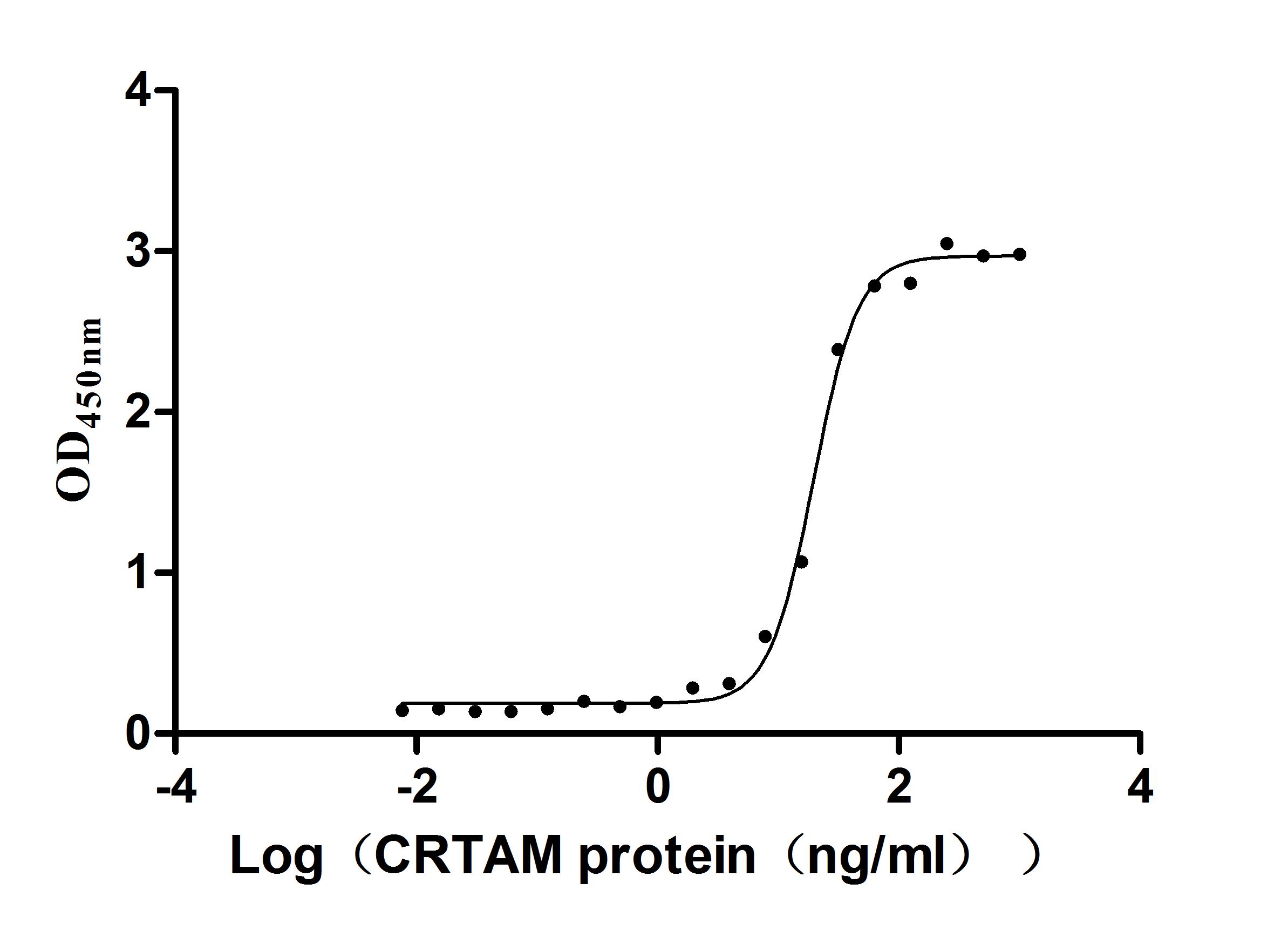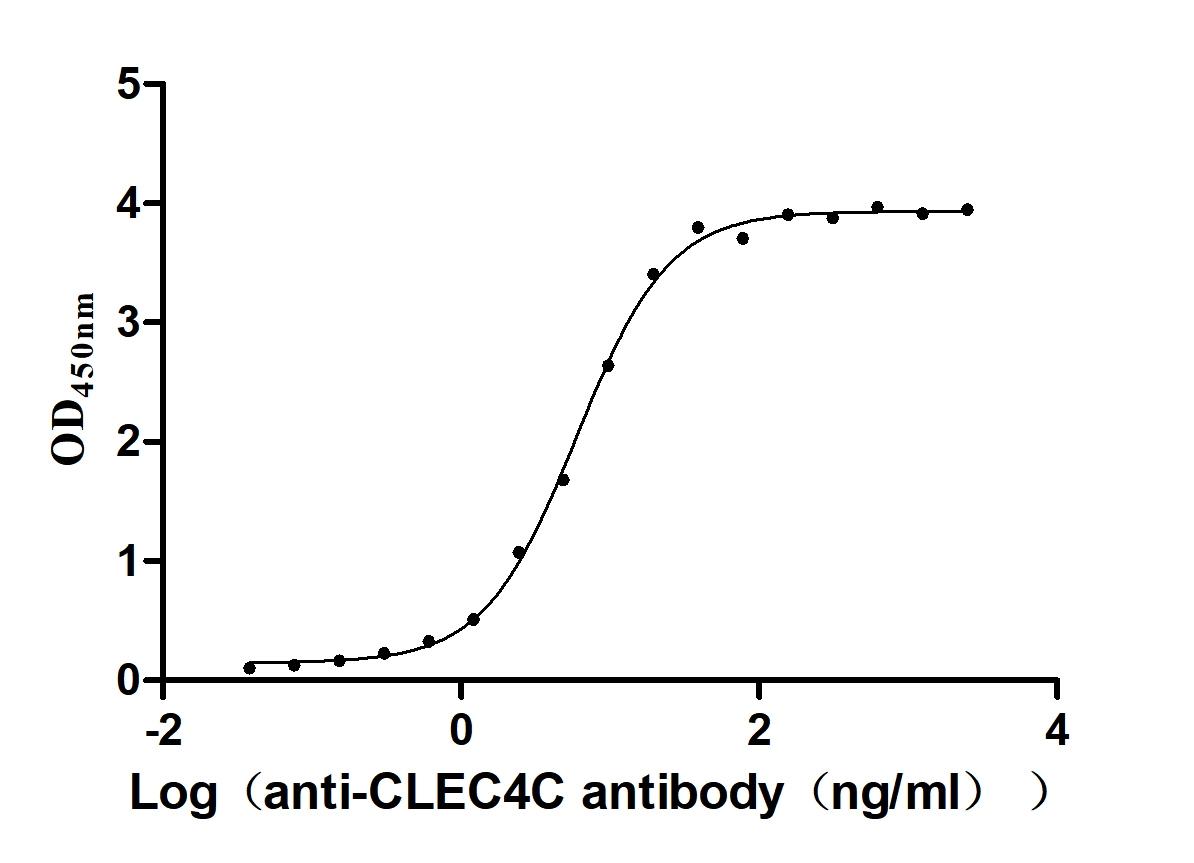Recombinant Human E3 ubiquitin-protein ligase RNF213 (RNF213), partial
-
中文名稱:人RNF213重組蛋白
-
貨號:CSB-YP717453HU
-
規格:
-
來源:Yeast
-
其他:
-
中文名稱:人RNF213重組蛋白
-
貨號:CSB-EP717453HU
-
規格:
-
來源:E.coli
-
其他:
-
中文名稱:人RNF213重組蛋白
-
貨號:CSB-EP717453HU-B
-
規格:
-
來源:E.coli
-
共軛:Avi-tag Biotinylated
E. coli biotin ligase (BirA) is highly specific in covalently attaching biotin to the 15 amino acid AviTag peptide. This recombinant protein was biotinylated in vivo by AviTag-BirA technology, which method is BriA catalyzes amide linkage between the biotin and the specific lysine of the AviTag.
-
其他:
-
中文名稱:人RNF213重組蛋白
-
貨號:CSB-BP717453HU
-
規格:
-
來源:Baculovirus
-
其他:
-
中文名稱:人RNF213重組蛋白
-
貨號:CSB-MP717453HU
-
規格:
-
來源:Mammalian cell
-
其他:
產品詳情
-
純度:>85% (SDS-PAGE)
-
基因名:
-
Uniprot No.:
-
別名:ALK lymphoma oligomerization partner on chromosome 17; C17orf27; Chromosome 17 open reading frame 27; E3 ubiquitin-protein ligase RNF213; FLJ13051; KIAA1554; MGC46622; MGC9929; MYMY2; Mysterin; MYSTR; NET57; RING finger protein 213; RN213_HUMAN; RNF 213; RNF213
-
種屬:Homo sapiens (Human)
-
蛋白長度:Partial
-
蛋白標簽:Tag?type?will?be?determined?during?the?manufacturing?process.
The tag type will be determined during production process. If you have specified tag type, please tell us and we will develop the specified tag preferentially. -
產品提供形式:Lyophilized powder
Note: We will preferentially ship the format that we have in stock, however, if you have any special requirement for the format, please remark your requirement when placing the order, we will prepare according to your demand. -
復溶:We recommend that this vial be briefly centrifuged prior to opening to bring the contents to the bottom. Please reconstitute protein in deionized sterile water to a concentration of 0.1-1.0 mg/mL.We recommend to add 5-50% of glycerol (final concentration) and aliquot for long-term storage at -20℃/-80℃. Our default final concentration of glycerol is 50%. Customers could use it as reference.
-
儲存條件:Store at -20°C/-80°C upon receipt, aliquoting is necessary for mutiple use. Avoid repeated freeze-thaw cycles.
-
保質期:The shelf life is related to many factors, storage state, buffer ingredients, storage temperature and the stability of the protein itself.
Generally, the shelf life of liquid form is 6 months at -20°C/-80°C. The shelf life of lyophilized form is 12 months at -20°C/-80°C. -
貨期:Delivery time may differ from different purchasing way or location, please kindly consult your local distributors for specific delivery time.Note: All of our proteins are default shipped with normal blue ice packs, if you request to ship with dry ice, please communicate with us in advance and extra fees will be charged.
-
注意事項:Repeated freezing and thawing is not recommended. Store working aliquots at 4°C for up to one week.
-
Datasheet :Please contact us to get it.
相關產品
靶點詳情
-
功能:E3 ubiquitin-protein ligase involved in angiogenesis. Involved in the non-canonical Wnt signaling pathway in vascular development: acts by mediating ubiquitination and degradation of FLNA and NFATC2 downstream of RSPO3, leading to inhibit the non-canonical Wnt signaling pathway and promoting vessel regression. Also has ATPase activity.
-
基因功能參考文獻:
- Data indicate that mysterin/RNF213 is a substrate of ubiquitin specific protease 15 (USP15), and that the conserved skipping of exon 7 significantly decreases its specific affinity for mysterin. PMID: 28276505
- Meta-analysis showed a statistically significant association between RNF213 p.R4810K and moyamoya disease, intracranial major artery stenosis/occlusion, and quasi-moyamoya disease. Apart from the first 2 diseases, no significant association was identified under the recessive, the homozygote, and the heterozygote models in intracranial major artery stenosis/occlusion. PMID: 29752070
- We conclude that RNF213 is a gene associated with susceptibility to ICAS in CADASIL patients. MRA follow-up and close observation are necessary for CADASIL patients with the RNF213 variant, as they may be predisposed to ICAS. PMID: 29500468
- RNF213 p.R4810K polymorphism was associated with an increased risk of intracranial major artery stenosis/occlusion in the East Asian populations. PMID: 29482934
- in the present study demonstrated, for the first time, that serum sCD163 and CXCL5 levels were significantly elevated in moyamoya diseases(RNF213 mutation) patients compared to those in healthy controls. PMID: 29174692
- RNF213 4810G>A and RNF213 4950G>A were more frequent in MMD patients. We have confirmed that RNF213 4810G>A and 4950G>A are strongly associated with Korean MMD in children and adults as well as for the ischemic and hemorrhagic types. PMID: 29160859
- The major finding of the present study is that genetic variant RNF213 c.14576G>A was significantly associated with anterior circulation of Intracranial Atherosclerosis but not with posterior Circulations of Intracranial Atherosclerosis. PMID: 28797616
- Genotyping of the p.R4810K missense variant is useful for identifying individuals with an elevated risk for steno-occlusive intracranial arterial diseases in the family members of patients with moyamoya disease. PMID: 28506590
- Significant association between rare missense RNF213 variants and moyamoya angiopathy was found in European patients. PMID: 28635953
- Variants in RNF213 are associated with increased susceptibility to moyamoya vasculopathy (MMV). Our findings suggest that RNF213 variants may play a role in the development of MMV in patients with hemangioma syndromes associated with congenital cerebral arterial anomalies PMID: 28686325
- Caveolin-1 level was decreased in patients with Moyamoya disease and markedly decreased in RNF213 variant carriers. Path analysis showed that the presence of the RNF213 variant was associated with caveolin-1 levels that could lead to Moyamoya disease. PMID: 27462098
- The p.R4810K variant was associated with atherosclerotic and autoimmune quasi-Moyamoya disease in a Chinese population, and a lower prevalence of this variant in patients with quasi-Moyamoya disease compared with patients with Moyamoya disease was observed. PMID: 28063898
- These results suggest that, in our cohort of Korean patients, the p.Arg4810Lys is the only variant that is strongly associated with Moyamoya disease among the 30 RNF213 variants listed in the Human Gene Mutation Database. PMID: 28617845
- is a susceptibility gene not only for moyamoya disease but also for intracranial atherosclerotic stenosis in East Asians. PMID: 27253870
- This study suggests that the rs112735431 polymorphism of the RNF213 may be linked to the hypertension in moyamoya disease. PMID: 28320162
- PTP1B/RNF213/alpha-KGDD pathway is critical for survival of HER2(+) breast cancer, and possibly other malignancies, in the hypoxic tumour microenvironment PMID: 27323329
- Both RNF213 D4013N and V4146A significantly decreased re-endothelialization in the migration assay compared with RNF213 WT and the control vector. PMID: 27736983
- We found that RNF213 single nucleotide polymorphism rs6565666 was associated with intracranial aneurysms in French-Canadian individuals. PMID: 27745834
- The RNF213 p.R4810K variant appears to be significantly associated with coronary artery disease in the Japanese population. PMID: 28414759
- RNF213 p.R4810K polymorphism was significantly associated with quasi-moyamoya disease. PMID: 27476341
- RNF213 is not only associated with MMD but also associated with intracranial major artery stenosis. The genotypes of RNF213 correlate with the phenotypes of MMD. PMID: 27748344
- Case-control study and meta-analysis both provide evidence of an association between the rs112735431 polymorphism in the RNF213 gene and moyamoya risk. PMID: 27515544
- This is the first report, to our knowledge, of different moyamoya disease phenotypes in a familial case involving the same heterozygous c.14429G > A variant in RNF213. PMID: 26315205
- Results suggested that rs112735431 in RNF213 was associated with increased risk of moyamoya disease, especially among Japanese and Korean compared with Chinese. [meta-analysis]. PMID: 26847828
- The RNF213 c.14576G>A variant is more common in NF-1 patients who develop moyamoya syndrome than in NF-1 patients without moyamoya syndrome. PMID: 26849809
- The findings indicate that the c.14429G>A (p.R4810K) allele of RNF213 is strongly associated with Korean patients with MMD. The homozygous c.14429G>A (p.R4810K) variant is particularly related to early-onset MMD. PMID: 26430847
- We herein report pediatric sibling patients of moyamoya disease who have homozygous wild-type c.14576G>A variant in RNF213, showing different clinical course and disease severity. PMID: 26277359
- RNF213 plays unique roles in endothelial cells for proper gene expressions in response to inflammatory signals from environments. PMID: 26278786
- There are strong associations between p.R4859K and p.R4810K polymorphisms of the RNF213 gene and Moyamoya disease (Meta-analysis). PMID: 23466837
- RNF213 was not associated with bipolar disorder or schizophrenia. PMID: 25053281
- Gene-based association analyses shows nominal significant association with multifocal fibromuscular dysplasia for RNF213. PMID: 26147384
- results confirm that the RNF213 p.Arg4810Lys variant is not uncommon in the general Korean population and provide reference data for the association of this variant and MMD PMID: 26590131
- Not only p.4810K but also other functional missense variants of RNF213 conferred susceptibility to moyamoya disease(MMD). PMID: 25964206
- This study demonstrated that the RNF213 mutation should form part of the diagnostic workup for moyamoya in clinical practice. PMID: 25956231
- Nonatherosclerotic quasi-MMD did not have RNF213 c.14576G>A variant. PMID: 25817623
- vascular wall was significantly thinner in RNF213-/- mice at 14 days PMID: 25383461
- Study identified of a novel RNF213 variant in a three-generation family of European ancestry with intracerebral vasculopathy displaying variability in age of onset and clinical severity PMID: 25043520
- Alterations in RNF213 predispose patients of diverse ethnicities to Moyamoya disease. PMID: 25278557
- the moyamoya disease-associated gene product is a unique protein that functions as ubiquitin ligase and AAA+ ATPase, which possibly contributes to vascular development through mechanical processes in the cell. PMID: 24658080
- RNF213 R4810K induced mitotic abnormalities and increased risk of genomic instability. PMID: 23994138
- A particular subset of patients with various phenotypes of ICASO has a common genetic variant, RNF213 c.14576G>A, indicating that RNF213 c.14576G>A variant is a high-risk allele for ICASO. PMID: 23970789
- A homozygous c.14576G>A variant of RNF213 gene is associated with neurological deficits with vasculopathy in moyamoya disease. PMID: 22931863
- RNF213 R4810K reduced angiogenic activities of iPSECs from patients with MMD, suggesting that it is a promising in vitro model for MMD. PMID: 23850618
- the influences of PDGFRB, MMP-3, and TIMP-2 on MMD may be unremarkable in Chinese Hans. There may be no prominent interaction among these five gene polymorphisms on the occurrence of MMD. PMID: 23769926
- Moyamoya disease is often accompanied by hypertension. RNF213 has been identified as a susceptibility gene for this disease. Associations of p.R4810K (rs112735431, ss179362673) of RNF213 with blood pressure were investigated in moyamoya disease patients. PMID: 22878964
- RNF213 mutations are associated with MMD susceptibility in Han Chinese. The ischemic type MMD is particularly related to the R4810K mutation. PMID: 23110205
- We propose the existence of a new entity of intracranial major artery stenosis/occlusion caused by the c.14576G>A variant in RNF213. PMID: 23010677
- The homozygous c.14576G>A variant in RNF213 could be a good DNA biomarker for predicting the severe type of moyamoya disease PMID: 22377813
- involvement of RNF213 in genetic susceptibility to moyamoya disease PMID: 21799892
- KIAA1618 (ALO17) ia a novel fusion partner of anaplastic lymphoma kinase in anaplastic large-cell lymphoma and inflammatory myofibroblastic tumor cases. PMID: 12112524
顯示更多
收起更多
-
相關疾病:Moyamoya disease 2 (MYMY2)
-
亞細胞定位:Cytoplasm, cytosol.
-
蛋白家族:AAA ATPase family
-
組織特異性:Widely expressed (at protein level).
-
數據庫鏈接:
Most popular with customers
-
Recombinant Human Tumor necrosis factor receptor superfamily member 18 (TNFRSF18), partial (Active)
Express system: Mammalian cell
Species: Homo sapiens (Human)
-
Recombinant Human Heat-stable enterotoxin receptor (GUCY2C), partial (Active)
Express system: Mammalian cell
Species: Homo sapiens (Human)
-
Recombinant Human IGF-like family receptor 1 (IGFLR1), partial (Active)
Express system: Mammalian cell
Species: Homo sapiens (Human)
-
Recombinant Human IL12B&IL12A Heterodimer Protein (Active)
Express system: Mammalian cell
Species: Homo sapiens (Human)
-
Recombinant Human Lymphocyte antigen 6 complex locus protein G6d (LY6G6D) (Active)
Express system: Yeast
Species: Homo sapiens (Human)
-
Recombinant Human Claudin-6 (CLDN6)-VLPs, Fluorescent (Active)
Express system: Mammalian cell
Species: Homo sapiens (Human)
-
Recombinant Human Cell adhesion molecule 1 (CADM1), partial (Active)
Express system: Mammalian cell
Species: Homo sapiens (Human)
-
Recombinant Macaca fascicularis C-type lectin domain family 4 member C(CLEC4C), partial (Active)
Express system: Mammalian cell
Species: Macaca fascicularis (Crab-eating macaque) (Cynomolgus monkey)


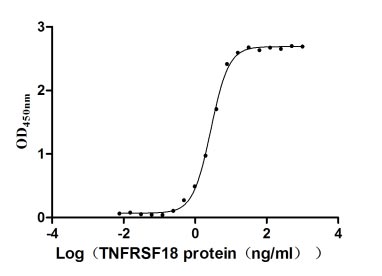
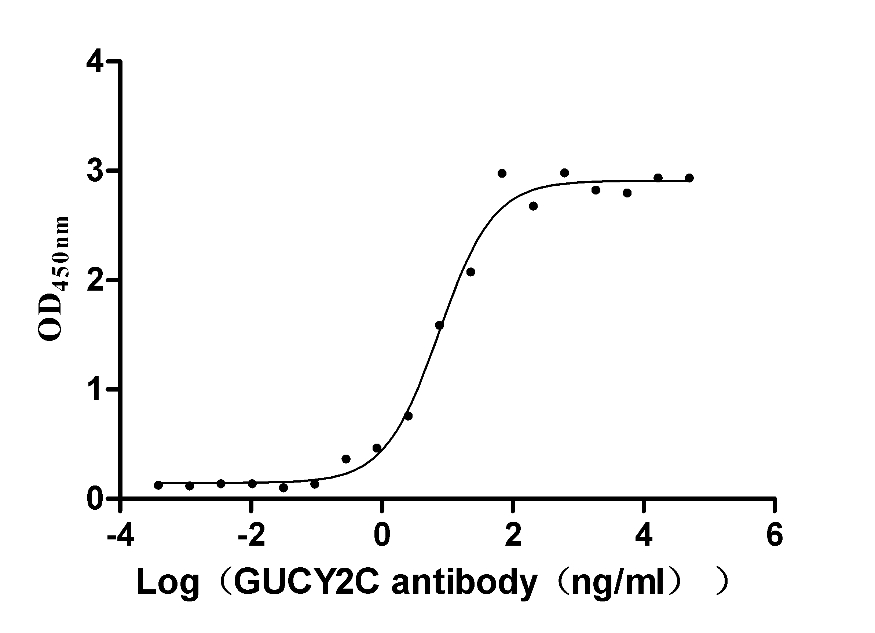
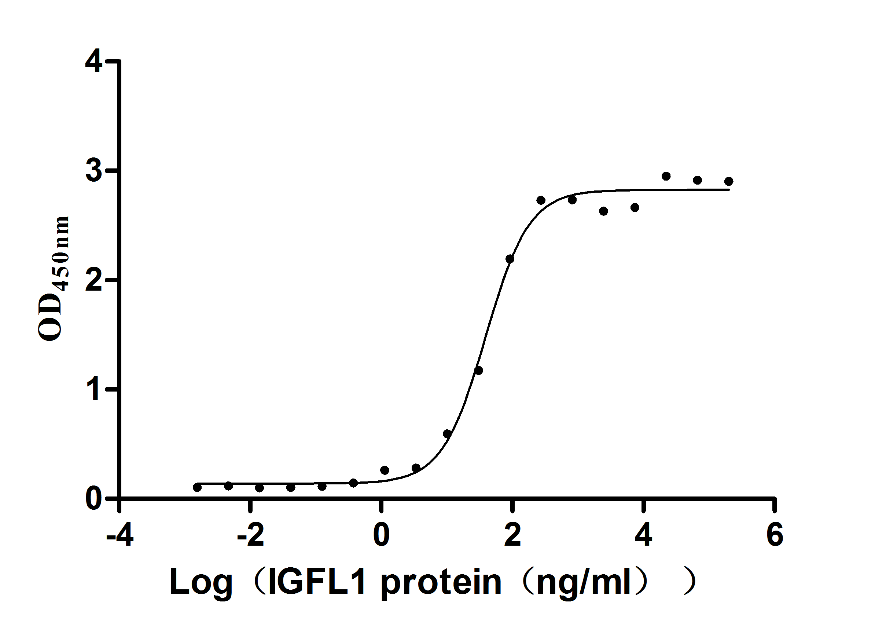
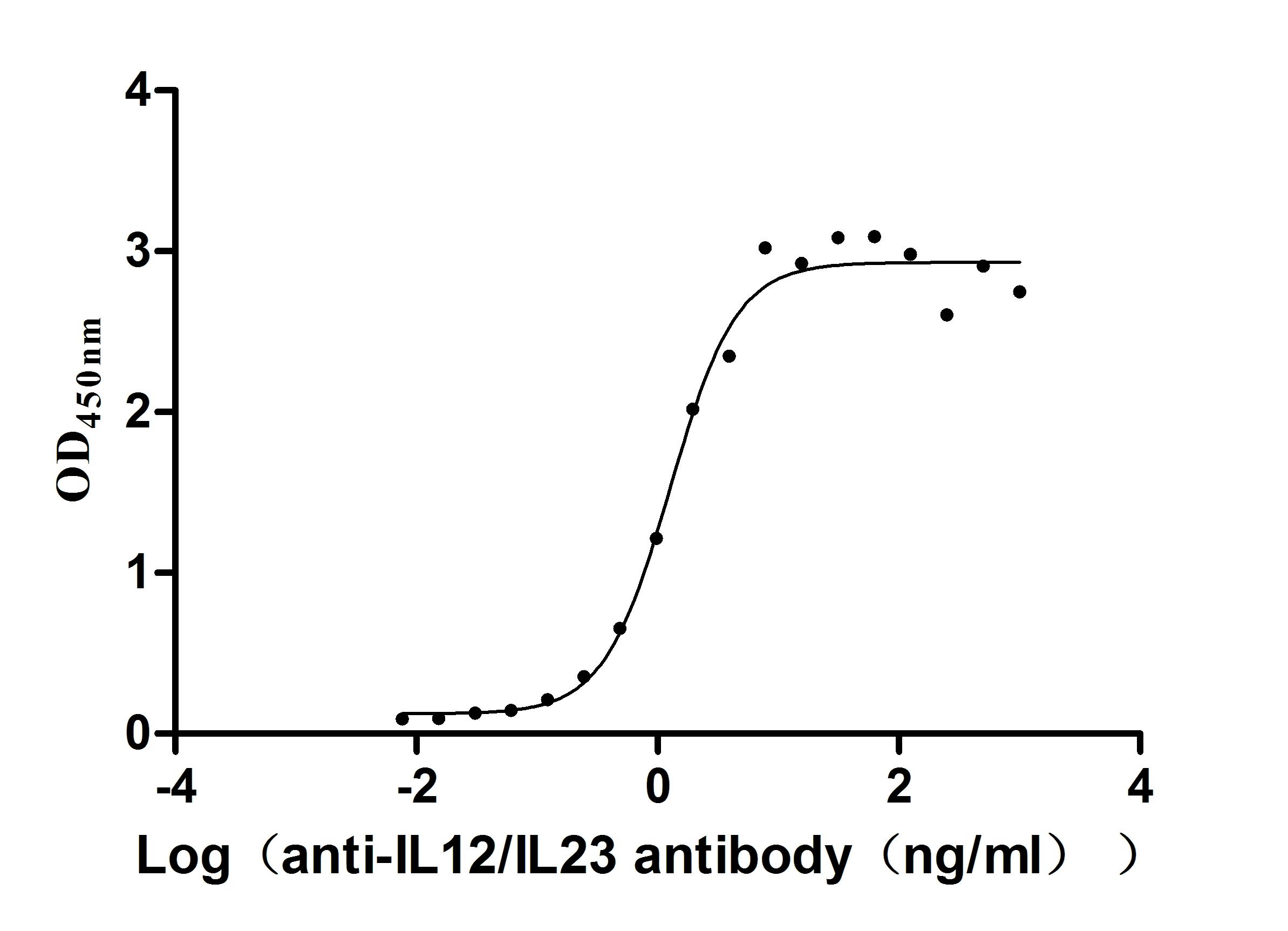
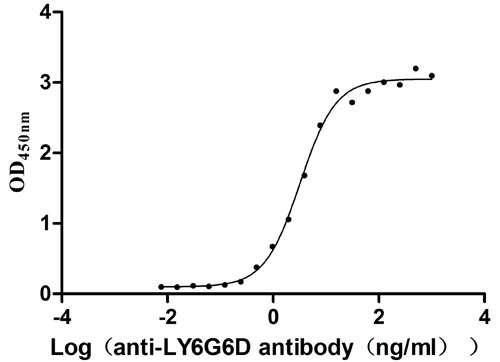
f4-AC1.jpg)
